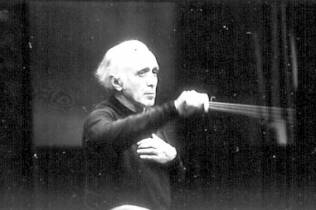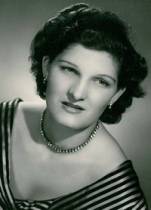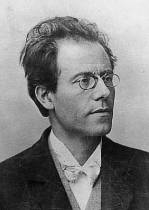
Jascha Horenstein (May 6, 1898 - Kiev, Ukraine - April 2, 1973 London, England) The distinguished Russian-born American conductor, Jascha Horenstein, began his musical training in Königsberg as a piano student of his mother, and he also studied with Max Brode. In 1911 his family moved to Vienna, where he studied philosophy at the University and, starting from 1916, was a pupil of A. Busch (violin), Joseph Marx (music theory), and Franz Schreker r (composition) at the Vienna Academy of Music. He then continued his training with Franz Schreker at the Berlin Hochschule für Musik (1920). From 1920 Jascha Horenstein served as an assistant to Wilhelm Furtwängler in Berlin and began his career conducting the Schubert Choir in Berlin. In 1923 he was a guest conductor with the Wiener Symphoniker. Returning to Berlin, he conducted the Blüthner Concerts (1924) and was conductor of the Berliner Symphoniker (1925-1928); he also appeared as a guest conductor with the Berliner Philharmoniker. He became principal conductor of the Düsseldorf Opera in 1928, and then the company's Generalmusikdirektor in 1929, but was removed from that position in March 1933 by the Nazi regime because he was a Jew. His Düsseldorf tenure was the only permanent musical directorship in his career. After conducting in Europe, Australia, New Zealand, and Palestine, he went to the USA in 1940 and became a naturalized American citizen. He also taught at the New School for Social Research while in New York City. Following the end of World War II, Jascha Horenstein resumed his career in Europe. He became especially admired in England, where he appeared as a guest conductor with the London Symphony Orchestra. In 1961 he made his debut at London's Covent Garden conducting Fidelio. His final operatic, and British, engagement was his March 1973 performances at the Royal Opera House, Covent Garden of Richard Wagner's Parsifal. 
Jennifer Vyvyan (13 March 1925 - 5 April 1974)
Born in Broadstairs, England, Vyvyan entered the Royal Academy of Music in 1941 where she initially was a piano student. She was convinced by a faculty member to pursue a singing career and began her initial studies as a mezzo-soprano. During her last two and a half years at the conservatory she studied with Roy Henderson who trained her in the soprano repertoire. After graduating in 1947 she went to Milan for further studies and later studied privately with Fernando Carpi in Geneva in 1950. In 1951 she won the Geneva International Singing Competition. In 1948 Vyvyan became a member of Benjamin Britten's English Opera Group (EOG), making her professional debut with the company as Jenny Diver in the première of Britten's version of John Gay's The Beggar’s Opera. She appeared in several more roles with the organization over the next two years, including Nancy in Albert Herring and the Female Chorus in The Rape of Lucretia. In 1951 she created the role of the Matron in the premiere of Brian Easdale's The Sleeping Children with the EOG in Cheltenham. In 1952 Vyvyan joined the roster of principal sopranos at the Sadler's Wells Opera, making a triumphant debut with the company as Konstanze in Wolfgang Amadeus Mozart's Die Entführung aus dem Serail. She returned to that house later in the season to portray Donna Anna in Don Giovanni. On 8 June 1953 she made her Royal Opera, London debut as Lady Penelope Rich in the world premiere of Britten's Gloriana, a production organized by the EOG. She sang in another EOG production for her debut at La Fenice on 14 September 1954; this time The Governess in the premiere of Britten's The Turn of the Screw. Vyvyan sang in many more world premieres during her career, including Tytania in Britten's A Midsummer Night's Dream (Aldeburgh Festival, 1960), the Countess de Serindan in Malcolm Williamson's The Violins of Saint-Jacques (1966, Sadler’s Wells), various roles in Williamson's Lucky-Peter’s Journey (1969, Sadler’s Wells) and Mrs. Julian in Britten’s Owen Wingrave (1971, BBC television). She also premiered Arthur Bliss's The Beatitudes in the 1962 festival for the opening of Coventry Cathedral, and gave the first UK performance of Britten's Cantata Academica in 1961 as well as the UK premiere of Poulenc's Les Mammelles de Tiresias (Aldeburgh 1958). In 1953 Vyvyan portrayed Elettra in Idomeneo at the Glyndebourne Festival. Further opera performances and concerts took her to the stages of Milan, Rome, Munich, Vienna, Paris and Amsterdam. In 1955 she undertook a major tour of the Soviet Union as part of a delegation of British artists organised by Sir Arthur Bliss. In 1969 she performed at the Lucerne Festival. She remained a regular presence at the Royal Opera House as well during the 1950s and 1960s. On the concert stage, Vyvyan performed throughout Europe and the United States under such conductors as Guilini, Bernstein, Kubelik, Monteux, Ansermet, de Sabata, Krips and Britten, excelling in performances of British music. She also appeared often on the radio and on television, including some of the earliest complete operas broadcast on British TV. She excelled in Handel and played a major role in the revival of his operas/oratorios - with pioneering performances of Athalia, Samson, Amadigi, Rinaldo, Saul, and the first known staging in modern times of Radamisto (Sadlers Wells, 1960). She was also known for her interpretations of the soprano solos in Beethoven's Symphony No. 9, Britten's War Requiem, and Bach's St John Passion and St Matthew Passion. Having never retired, Vyvyan died from complications of a longstanding bronchial illness on 5 April 1974 at the age of 49.
***************************************************

Gustav Mahler Symphony no 4 in G major Jennifer Vyvyan, soprano 25.01.1968 Symphony no 5 in C sharp minor 16.10.1969 Gothenburg Symphony Orchestra Jascha Horenstein ********************************
Записи из коллекции Миши Горенштейна. | 
